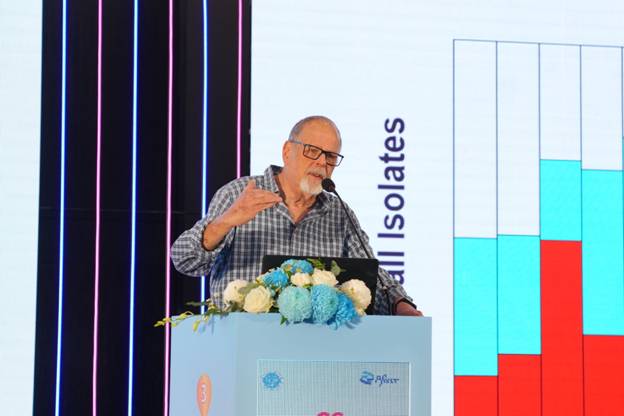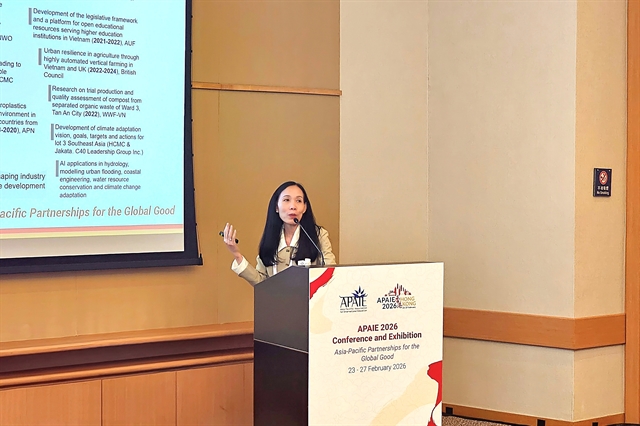 Society
Society


|
| Ron Dagan, a distinguished professor of Pediatrics and Infectious Diseases, gives a speech at the series of scientific symposia. — Photo courtesy of Pfizer Vietnam |
HCM CITY — Through a recent series of scientific symposia, more than 1,800 health care professionals nationwide both online and on site have had a chance to learn the latest scientific advances in the management and prevention of pneumococcal diseases to have more comprehensive insights and give patients the most up-to-date and accurate medical advice.
The events, entitled “Pneumococcal Disease Prevention: Understanding the Pneumococcal Conjugate Vaccines – Recommendations to Protect Children”, were co-organised by Pfizer Vietnam Limited Company and the Centre for Health Professionals Training of the HCM City University of Medicine and Pharmacy, aiming to share new knowledge to healthcare professionals in Việt Nam.
It consisted of five symposia held in Hà Nội and HCM City from August 25 to 29, with the attendance of health care professionals and leading international experts in pediatrics and prevention of infectious diseases nationwide and around the world.
The symposia aimed to update and discuss the burden of pneumococcal disease in children and adults; and share experiences from local and international experts on the role of PCV vaccines in the prevention of pneumococcal disease.
It also gave updates with real world data about serotype changes after PCV vaccination and shared experiences in deploying PCV vaccination in other countries around the world.
The highlight was presentations of the developing trends of polyvalent vaccines that highlighted the value of pneumococcal vaccines to patients and society at large.
Speaking at the the event, Asso. Prof. Cao Hữu Nghĩa, head of the Biomedical Science Department, Pasteur Institute in HCM City, said: “Vaccination is one of the safest and most effective ways to prevent infectious diseases, not only for children but also for adults.”
The global COVID-19 pandemic was an alarm bell about the danger of diseases, be they emerging diseases, seasonal epidemics, or dangerous infections.
In addition to other preventive measures, the role of vaccines is extremely important to limit the spread, and reduce morbidity and mortality rates.
Pneumococcus is one of the most dangerous pathogens in both children and adults that can be actively prevented with vaccines.
Ron Dagan, a distinguished professor of Pediatrics and Infectious Diseases, said, “pneumococcus is a dangerous agent and fortunately there has been a vaccine to prevent it since 2000."
In addition to preventing dangerous diseases caused by Streptococcus pneumoniae such as pneumonia, meningitis, sepsis or otitis media, PCV had a significant impact in preventing otitis media caused by nontypeable haemophilus influenzae (NTHi) of unspecified type, according to many studies around the world.
Doctor of Philosophy Mark Peter Gerard van der Linden, a researcher at the Reference Laboratory for Streptococci at the University Hospital RWTH in Aachen, Germany, said real life data have shown that cross-protection of serotypes in PCVs is rarely functional, with only reasonable levels of protection observed within serogroup 6.
However, direct protection is still prioritised over the potential for cross-protection.
“Therefore, the development trend of conjugate vaccines is increasingly consisting of more serotypes,” he said.
Darrell Oh, general director of Pfizer Vietnam, said the company has made great efforts to help Việt Nam solve the challenges of disease prevention and treatment for years.
“We are proud of Pfizer’s mission: ‘breakthroughs that change patients' lives’, and launching the world's first Pneumococcal vaccine,” he said.
Fostering collaboration across public and private stakeholders will help accelerate the ability of the health care system to respond to current healthcare challenges like Pneumococcal disease, he said.
This series of pneumococcal scientific symposia is a clear commitment of the company’s efforts in the mission of accompanying, supporting, and providing up-to-date scientific knowledge and medical advancements to Vietnamese health care professionals. — VNS




